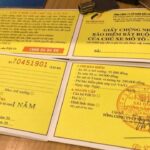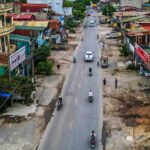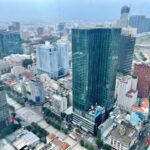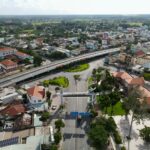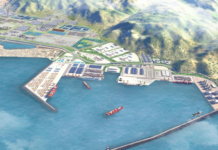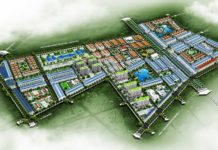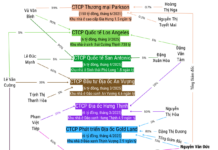Agricultural land broker, Mr. Nguyen Minh Hai, based in Quoc Oai, Hanoi, revealed that in recent months, investors have been actively seeking and purchasing agricultural land, including rice fields, causing a buzz in this market segment. Investors are looking to buy cheap agricultural land, anticipating compensation equal to residential land prices, as per the new Law on Land 2024.
Mr. Hai also shared that previously, the transfer of agricultural land was restricted to locals, and even farmers from other provinces were not allowed to purchase it. As a result, investors had to rely on locals to act as nominal owners. However, with the amended Land Law, there are no longer any restrictions on who can receive land transfers. This has led to a recent surge in market activity.
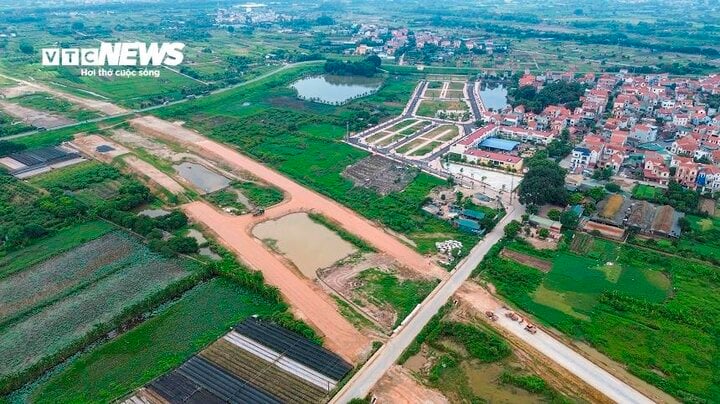
Agricultural land prices are rising, but is it a good investment now? (Illustrative image: Minh Duc)
Mr. Pham Duc Toan, CEO of EZ Property, shared his perspective on this trend, stating that the real estate market is witnessing an influx of investors and investment groups buying up agricultural land to capitalize on the changes brought about by the amended Land Law. One of the most notable changes that has caught investors’ attention is the increase in the limit for receiving land-use rights transfers, now up to 15 times the land allocation limit in the locality.
Additionally, the scope of transferees has been expanded, allowing individuals and organizations not directly engaged in agricultural production to receive land transfers. Notably, if agricultural land is revoked, compensation will be made in the form of money or housing. This has sparked interest from investors looking to acquire land in anticipation of future gains.
Furthermore, in the past, land transfers were complicated due to various legal obstacles, and the transaction value was not attractive. However, with the amended Land Law coming into effect, these issues have been largely addressed, and agricultural land is once again on the radar of investors.
Nevertheless, Mr. Toan cautioned that investing in agricultural land at this time also carries significant risks. The recent land fever has pushed up prices, and locals are reluctant to sell cheaply. Especially in areas with planned projects, landowners will opt to wait for higher compensation instead of selling.
“I know of an agricultural land investment group that failed and couldn’t even sell at a loss,” Mr. Toan said. “Investing in agricultural land involves more risks than opportunities, so caution is essential.”
Sharing a similar view, Dr. Dinh The Hien asserted that from an investment perspective, purchasing agricultural land is inefficient. In reality, it is not uncommon for agricultural land to be left abandoned. “Buying agricultural land and hoping for profits through speculation is a recipe for failure,” he added.
Additionally, for agricultural land to be converted into commercial or residential land, it must be included in the approved planning of the competent authority. Therefore, the idea of buying agricultural land, waiting for a change in land use purpose, and then subdividing and selling it is highly impractical.
Mr. Nguyen The Diep, Vice President of the Hanoi Real Estate Club, also warned of the risks associated with land speculation. If an investor gets entangled in a long-delayed project, their capital will be locked up for an extended period.
Furthermore, converting agricultural land to other types of land use is challenging and often impossible.
Notable changes regarding agricultural land in the amended Land Law 2024:
Clause 1, Article 96: “Households and individuals using agricultural land, when the State revokes the land and they meet the conditions for compensation as prescribed, shall be compensated with agricultural land or with money or with land of another type of use other than the revoked land or with housing”.
Clause 6, Article 11: “Households and individuals whose agricultural land and non-agricultural land, excluding residential land, is revoked, if they meet the conditions for land compensation as prescribed, and have a demand for compensation in the form of residential land or resettlement housing, and the locality has the conditions for residential land or resettlement housing, shall be compensated with residential land or resettlement housing”.
Clause 8, Article 45, stipulates the conditions for the implementation of the rights to convert, transfer, lease, leaseback, inherit, and donate the right to use land; mortgage, contribute capital with the right to use land; receive transfer, donation of the right to use land. Accordingly, the following cases shall not be allowed to receive transfer, donation of the right to use land:
– Economic organizations shall not be allowed to receive the transfer of the right to use protective forest land and special-use forest land of individuals, except for cases where the purpose of land use is changed according to the planning and plan for land use that has been approved by the competent authority;
– Individuals who do not live in the area of protective forest and special-use forest shall not be allowed to receive the transfer and donation of the right to use residential land and other land in the area of protective forest, in the strict protection sub-zone, and in the ecological rehabilitation sub-zone of the special-use forest;
– Organizations, individuals, community of residents, religious organizations, subordinate religious organizations, overseas Vietnamese, economic organizations with foreign investment that the law does not allow to receive the transfer, donation of the right to use land.
Thus, the 2024 Land Law no longer restricts individuals who do not directly engage in agricultural production from receiving transfers or donations of the right to use rice land.
Determination to Complete Land Clearance for the Tam Trinh Road Construction Project by the End of September 2024
Under the direction of the Hoang Mai District Party Committee, the site clearance and compensation for the Tam Trinh Road construction project is expected to be completed by October 1, 2024. The relevant agencies and units are diligently working together to implement effective solutions and encourage local residents to cooperate and hand over the required land area for the project’s success.
“Huge Disparity in Thu Duc City’s Land Prices: Official Resettlement Land Price Reaches 51 Million VND per square meter, While the Standard Land Price is Only 1.5 Million VND.”
In the latest development regarding adjustments to the current land price framework, the Ho Chi Minh City Department of Natural Resources and Environment has submitted a report to the Ministry of Natural Resources and Environment.
High-Speed Handover: TP HCM – Moc Bai Expressway from April 2025
The estimated cost for compensation, support, and resettlement for the project’s Component 3, which covers the city, is 7,102 billion VND, an increase of 1,832 billion VND from the previous figure. This significant rise in expenditure underscores the project’s complexity and scope, requiring meticulous planning and execution to ensure a successful and seamless transition for those affected.

